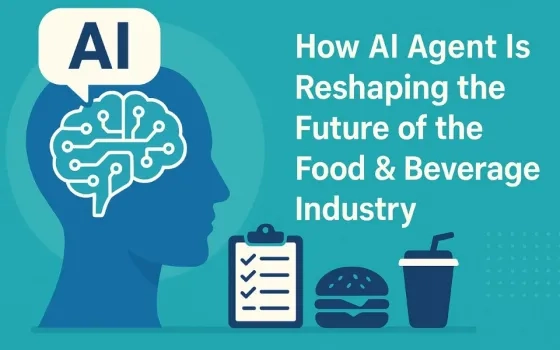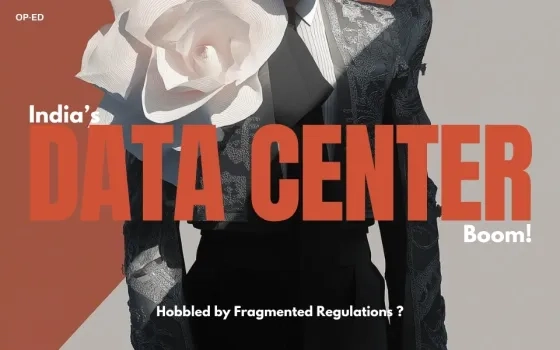In an industry as fast-paced and consumer-driven as food and beverage, staying ahead of the curve is not just a competitive edge—it’s a necessity. Consumer preferences are evolving, supply chains are getting more complex, and operational efficiency has become a survival metric. Amidst these challenges, Artificial Intelligence (AI) has emerged as a game-changer, offering transformative possibilities for startups and established businesses alike.
For new food startups, entrepreneurs, and CTOs, AI is no longer a futuristic concept—it’s an immediate opportunity to innovate, optimize, and scale. From personalized product recommendations and demand forecasting to smart inventory management and AI-driven food safety inspections, the food and beverage (F&B) ecosystem is undergoing a rapid transformation. At the heart of this transformation lies a powerful tool: AI agents—autonomous, adaptive software entities capable of learning and decision-making.
This blog dives deep into how AI agents are reshaping the future of the F&B industry, resolving long-standing challenges, and opening doors for unprecedented innovation.
Key Challenges in the Food & Beverage Industry
Despite its massive scale and cultural importance, the F&B industry faces persistent and growing challenges. Let’s explore a few of the most pressing ones:
1. Supply Chain Volatility
From global pandemics to geopolitical issues and climate change, supply chains are more vulnerable than ever. Ingredient shortages, delivery delays, and price volatility can cripple operations, especially for smaller startups without diversified supplier bases.
2. Food Waste and Sustainability
Roughly one-third of all food produced globally goes to waste. This has environmental, ethical, and economic implications. For startups focused on sustainability, minimizing waste is a core challenge.
3. Demand Forecasting
Predicting customer preferences is notoriously difficult. Seasonal trends, local tastes, and marketing campaigns all impact demand, making inventory planning a high-stakes guessing game for many operators.
4. Regulatory Compliance
Food safety laws vary widely by country and region. Ensuring consistent labeling, sanitation, and traceability can be overwhelming—especially for brands scaling globally.
5. Labor Shortages
Labor shortages are affecting every part of the food chain—from agricultural harvesting to restaurant kitchens. Automation offers promise, but it must be carefully integrated into existing workflows.
6. Customer Expectations
Today’s consumers expect speed, personalization, and transparency. Whether it’s allergen info, calorie counts, or personalized meal recommendations, meeting these expectations requires more than a manual process.
How AI Agents Are Resolving the Challenges of the Food & Beverage Industry?
AI agents—specialized programs that perceive environments, analyze data, and make autonomous decisions—are already addressing many of the above problems. Here's how:
1. Smarter Demand Forecasting
AI agents use historical data, market trends, social signals, and real-time sales inputs to forecast demand with remarkable accuracy. Unlike traditional models, AI learns and adapts continuously. For example, an AI agent can predict a spike in cold beverage sales during an unexpected heatwave and automatically adjust inventory and marketing strategies.
2. Reducing Food Waste
By integrating AI agents into inventory and supply chain management systems, startups can drastically reduce food spoilage. AI agents track shelf life, predict demand, and suggest optimal stock levels. They can even trigger dynamic pricing for near-expiry products to ensure they’re sold rather than wasted.
3. Streamlined Supply Chain Management
AI agents coordinate logistics, optimize delivery routes, and identify inefficiencies in the supply chain. Real-time tracking of shipments, predictive maintenance for delivery vehicles, and dynamic vendor management all become possible.
4. Personalized Customer Experiences
Using AI agents in customer-facing platforms allows businesses to personalize menu recommendations based on dietary preferences, purchase history, and even biometric data from wearables. This kind of hyper-personalization leads to higher customer satisfaction and loyalty.
5. Enhanced Food Safety
AI-powered computer vision agents can inspect food products on production lines, identify anomalies, and flag safety risks in real-time. Other agents monitor temperature, hygiene levels, and process compliance, ensuring a safer and more reliable product.
6. Operational Cost Optimization
From automating routine kitchen tasks to optimizing energy usage in cold storage, AI agents significantly reduce operational costs. Virtual agents can also handle customer service, reservations, and order tracking, freeing up human staff for higher-value tasks.
Types of AI Agents in the Food & Beverage Industry
AI agents are not one-size-fits-all. Different types serve specific functions within the F&B ecosystem. Here are some common categories:
1. Predictive Analytics Agents
These agents analyze historical and real-time data to forecast future trends—whether it’s inventory demand, price fluctuations, or foot traffic. Ideal for CFOs and operations managers looking to reduce uncertainty in decision-making.
2. Computer Vision Agents
Used in food safety inspections, quality control, and even checkout-free retail experiences. They detect anomalies, recognize ingredients, and verify visual standards—reducing human error and boosting efficiency.
3. Conversational Agents (Chatbots)
Customer-facing agents used for taking orders, handling inquiries, or providing nutritional info. Integrated into mobile apps, websites, or kiosks, they enhance engagement and reduce customer service costs.
4. Robotic Process Automation (RPA) Agents
These agents handle repetitive back-office tasks like invoice processing, compliance reporting, and vendor coordination. They improve accuracy and free up human time for strategic tasks.
5. Supply Chain Agents
Dedicated to logistics, these agents optimize routes, manage inventory across locations, and forecast procurement needs. They ensure smoother operations and just-in-time inventory flow.
6. Recommendation Agents
Used in online food delivery platforms and direct-to-consumer websites, they suggest meals, products, or pairings based on user behavior and preferences, enhancing upsell opportunities.
As adoption grows, AI Agent pricing models are evolving too—often based on usage, performance, or custom features—making it accessible for both startups and enterprises.
AI Agents: Future of Food and Beverage Innovation
As AI agents continue to evolve, their potential for innovation in the F&B industry is only expanding. Here’s what the future might look like:
1. Autonomous Restaurants
Imagine a fast-food outlet run largely by AI agents: robots cooking meals, computer vision ensuring food quality, and conversational agents taking orders. We're not far from this reality. For startups, this presents a chance to build lean, scalable models with low overheads and consistent quality.
2. Zero-Waste Kitchens
AI will help create predictive, closed-loop systems where nothing goes to waste. Leftover ingredients could be dynamically incorporated into new dishes, sold to other businesses, or donated, all coordinated by AI agents.
3. Hyper-Personalized Nutrition
As wearables and health apps become more integrated, AI agents could create real-time diet plans tailored to an individual’s biomarkers, activity level, and lifestyle. This opens up a huge opportunity for health-focused food startups to innovate.
4. AI-Driven Product Development
Instead of spending months in R&D, AI agents can analyze market trends, competitor data, and consumer reviews to suggest new product ideas or tweak existing ones. This speeds up innovation and reduces time-to-market.
5. Ethical and Transparent Food Chains
AI agents can track food provenance, labor conditions, and carbon footprints, giving startups tools to prove their ethical credentials and meet increasing consumer demand for transparency.
6. Voice-Activated Dining
As voice assistants become more ubiquitous, AI agents can help restaurants and food apps integrate seamless, hands-free ordering systems—especially valuable for quick service restaurants or busy home cooks.
Conclusion
AI agents are not just an add-on—they’re becoming the core of a smarter, more resilient, and more customer-centric food and beverage industry. For startups and entrepreneurs, they offer a golden opportunity to leapfrog traditional bottlenecks and scale faster with fewer resources.
Whether you’re building a ghost kitchen, launching a niche food product, or reimagining restaurant operations, integrating AI agents—or choosing to build AI agent capabilities tailored to your needs—can give you a powerful edge. For CTOs, the imperative is clear: building intelligent infrastructure isn’t just about staying relevant—it’s about leading the next wave of food innovation.
The future of food is not only digital—it’s intelligent, adaptive, and agent-powered. Are you ready to serve it?




















